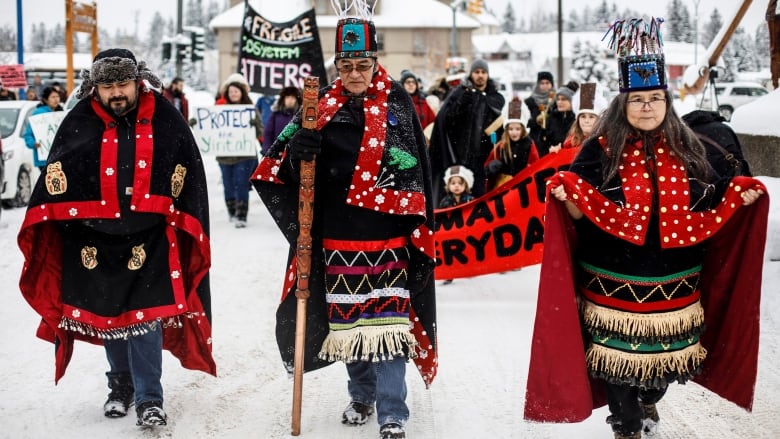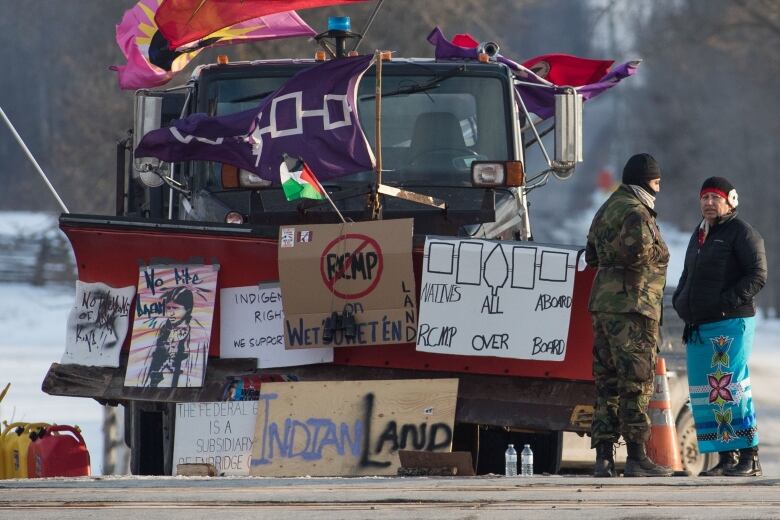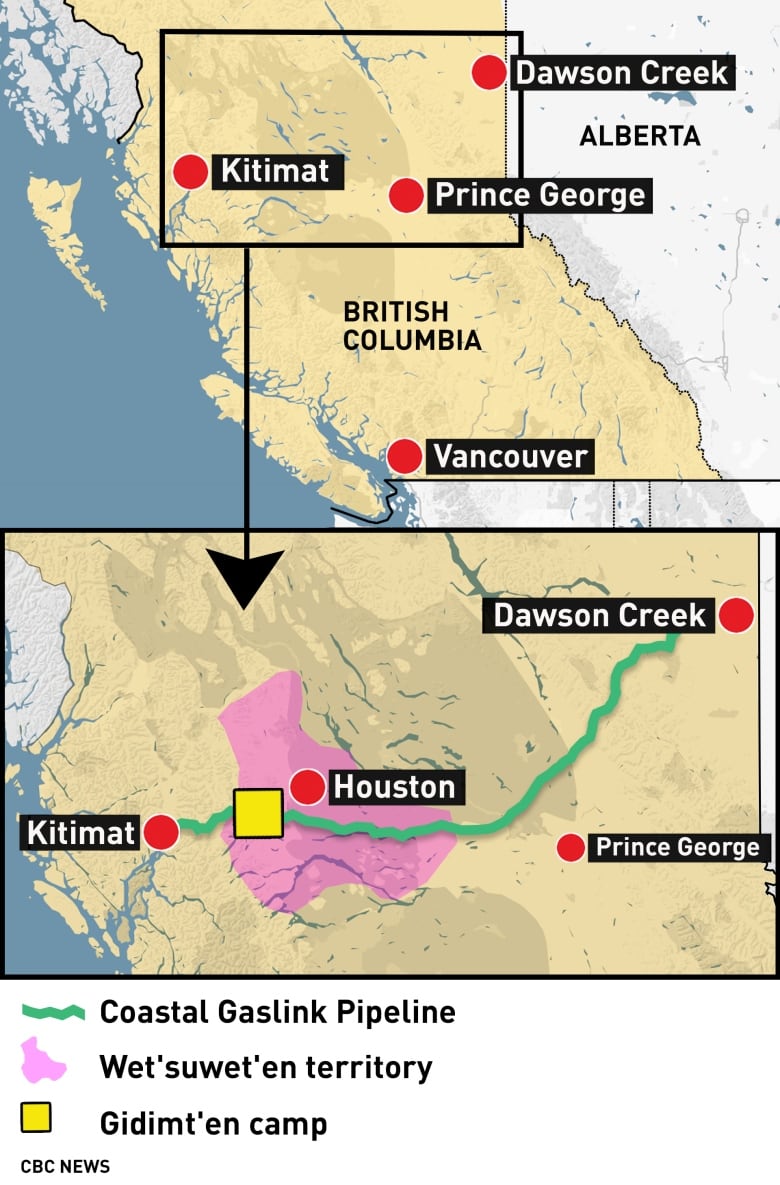Why 2 different kinds of Wet'suwet'en leaders support and oppose the gas pipeline
Band councils are responsible for reserves, traditional chiefs claim authority over larger territory

Anti-pipeline protesters from the Tyendinaga Mohawk Territory just east of Belleville, Ont., continue theirblockade that hasforcedCN Rail to shut down its network east of Toronto. Protesterssay the blockade is in support ofWet'suwet'en hereditary chiefs in B.C. who oppose the Coastal GasLink pipeline project which would partially runthrough their traditional territory.
Does thatmean, however, thatall the Wet'suwet'en people oppose the pipeline?
In the House of Commons on Tuesday,Andrew Scheerstressed that his Conservative Party stands in support of the project "with the elected councillors of the Wet'suwet'en" Nation and that "the vast majority ofof the Wet'suwet'en people" also approve of the pipeline.
But it's not as clear-cutas Scheer suggests. We answersome of the questions at the root of the dispute.
Who along the route supports the project?
The $6 billion,670-kilometre pipeline will deliver natural gas from the Dawson Creek area in northernB.C., heading west near Vanderhoof toa liquefaction facility inKitimat. It's part of a$40-billion LNG Canada project.
In September 2018, Coastal GasLink announced that it had signedcommunity and project agreements (also known as benefit agreements)with 20 First Nations band councils along the routeof thepipeline. The bandcouncils included those from theWet'suwet'en Nation.
Who is opposed?
Opposition to the pipeline is being mounted bythe majorityof Wet'suwet'en hereditary chiefs. The clan chiefs have said that despite the agreements signed by the nation's band councils,theproject needs the chiefs' authorization to proceed.

They say theband councils are responsible for onlythe territory within their individual reserves, which were created through the Indian Act. But the hereditary chiefs say theyare followingWet'suwet'enlaw, laws that predatecolonizationand the Indian Act,meaning they assert authorityover the broader 22,000 square kilometres of traditional territory that the pipeline would cross.
"They are following law, which says to them that they need to protect the lands with which they have a sacred connection, which is a much larger piece of territories thanthe band chiefs are responsible for," said Kim Stanton, aToronto-based lawyer who practices Aboriginallaw.
Do mostWet'suwet'en people back the project?
It's difficult to determine how many of the more than 3,000 members of theWet'suwet'en Nation approve of the pipeline project.But it has certainly garnered the support of the elected leadership.
Five of six band councils that govern the member nations that make upWet'suwet'enNationare among the 20 First Nations band councils to reach benefit agreements with Coastal GasLink. Those five councils represent: Skin Tyee First Nation, Wet'suwet'en First Nation,Witset First Nation,Nee Tahi Buhn Band and Burns Lake Band.
Bonnie Georgie, a member of the Witset First Nation and a former Coastal GasLink employee,told CBC Radio's As it Happens this month that while some people attendedmeetings and were very vocal in their opposition, "there's quite a bit of support for this project."
However a sixth band council of Wet'suwet'ennation theHagwilgetNation Village Council did not sign an agreement with Coastal GasLink.
Brian Michell, one of theirelected councillors,told The Canadian Press last yearthat the village council never got as far as hearing a dollar figure because they refused to entertain the idea of an agreement.
What aboutother First Nations with agreements?
There's likelyvarying degrees of support. In January,Chief Coun. Crystal Smith of the Haisla Nation in Kitimattold The Canadian Pressthat the project will help the community become less reliant on federal funding bycreating jobs for Indigenous people and lifting communities from poverty.
ButNak'azdli Whut'enChief AlexMcKinnon said signing an agreement with Coastal GasLink was one of the most difficult decisions he's ever made.
Stanton, the lawyer, said bands are forced to makevery difficult choices about whether to make deals with resource extraction companies.Indian Act bands have been chronically underfunded and under-resourced, she said.
"I think you can say that people are trying their best to do what they can for their people under very difficult circumstances. And when a resource extraction company comes along and says, 'Look, we have all of this money for you,' they are loathnot to take it."
"They're in between a rock and a hard place. I don't think it's a measure of unqualified support."
What's inthe agreements?
Coastal GasLinkhas said they won't comment on the benefitagreements since they are supposed to be confidential between the company and each First Nation. And so, those details have mostly been kept from the public.

However, last year, CBC's ChantelleBellrichardreported on aleaked benefits agreement withNak'azdli Whut'en. The agreementincludededucation and training benefits,contracting and employment opportunities, annual legacy payments over the lifetime of the pipeline, and "general project payments" to be made in three instalments.
However, one condition sparked criticism that the band will "take all reasonable actions" to dissuade its members from doing anything that could "impede, hinder, frustrate, delay, stop or interfere with the project, the project's contractors, any authorizations or any approval process."
That included dissuading band members from taking part "in any media or social media campaign."
HasB.C. made separate agreements with First Nations?
Yes. According to the province's website,British Columbia has signed natural gas benefitagreements with First Nations along the Coastal GasLink pipeline route. In all, there are 15 agreements signed. And details of those agreements are public.
For example, the agreement between the province andStellat'en First Nation stipulates the B.C. government will provide $2.53 million in exchange for allowing the pipeline on Stellat'en territory.
With files from Chantelle Bellrichard, Jorge Barrera and The Canadian Press













_(720p).jpg)


 OFFICIAL HD MUSIC VIDEO.jpg)
.jpg)



























































































